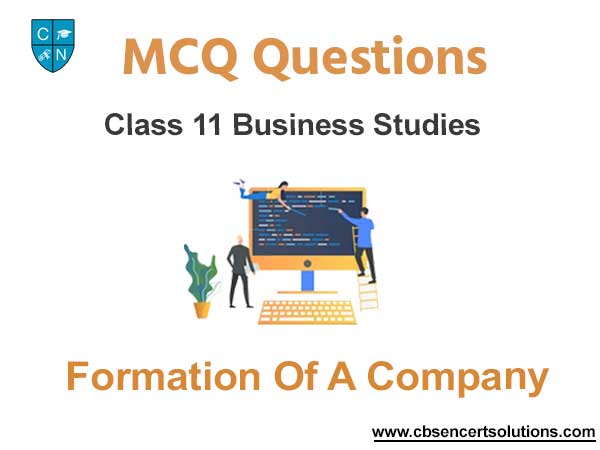Check the below NCERT MCQ Class 11 Business Studies Chapter 7 Formation of a Company with Answers available with PDF free download. MCQ Questions for Class 11 Business Studies with Answers were prepared based on the latest syllabus and examination pattern issued by CBSE, NCERT and KVS. Our teachers have provided below Formation of a Company Class 11 Business Studies MCQs Questions with answers which will help students to revise and get more marks in exams
Formation of a Company Class 11 Business Studies MCQs Questions with Answers
Refer below for MCQ Class 11 Business Studies Chapter 7 Formation of a Company with solutions. Solve questions and compare with the answers provided below.
Question. Amit is performing a business activity in which he enjoys all the profits and bears all the risk alone, which type of organisation do you think Amit is running:
(a) Partnership
(b) Company
(c) Sole proprietorship
(d) Joint stock company
Answer
C
Question. For example Par value is Rs10 and it is issued at Rs15 then Rs5 is the ___________ amount
(a) Profit
(b) Market value
(c) dividend
(d) premium
Answer
D
Question. The dividend payable to ___________ share holders is payable on fixed figure or percent
(a) Equity
(b) non preference
(c) Preference
(d) all of the above
Answer
C
Question. Minimum number of members to form a public company is
(a) 5
(b) 7
(c) 12
(d) 21
Answer
B
Question. Powers, rights, remuneration, qualification and duties of directors are discussed clearly in
(a) Memorandum of Association
(b) Articles of Association
(c) Prospectus
(d) none of the above
Answer
B
Question. Which of the following clause of the Memorandum of Association cannot be altered?
(a) Name
(b) Object
(c) Situation
(d) Liability
Answer
D
Question. Which type of organisation is not bound to show its accounts to anyone:
(a) Company
(b) Partnership
(c) Sole proprietorship
(d) Cooperative society
Answer
C
Question. The application for registration of a company should be presented to the registrar of the state in which the __________ of the company is to be situated
(a) Manufacturing plant
(b) first branch
(c) business office
(d) any of the above.
Answer
C
Question. Minimum number of members to form a private company is
(a) 2
(b) 3
(c) 5
(d) 7
Answer
A
Question. Contracts made after incorporation of a public company, but before issue of the certificate of commencement of business are
(a) Provisional contracts
(b) Post-incorporation contracts
(c) Preliminary contracts
(d) Contracts in the normal course of business.
Answer
A
Question. The company will be considered as separate person and different from its members from the date (when the) ____
(a) start of business
(b) Apply for registration
(c) receive incorporation certificate
(d) mentioned in certificate
Answer
D
Question. The Prospectus must be issued to the public within ______________ days of its date
(a) 30
(b) 60
(c) 90
(d) 100
Answer
C
Question. If the proposed nominal capital is more than 25 lakh at the time of incorporation then the company needs to submit ______ along with the application
(a) statement of capital
(b) certificate of incorporation
(c) certificate of capital
(d) certificate of incorporation
Answer
C
Question. Private company prohibits any invitation or acceptance of deposits from persons other than its ___________
(a) Members
(b) directors
(c) Partners
(d) Banks
Answer
A
Question. Non-executive directors of a public company may get remuneration on quarterly basis if such basis of payment is approved by/under
(a) Articles of association of the company
(b) General meeting of the company
(c) Central Government
(d) Schedule XIII of the Companies Act, 1956.
Answer
C
Question. If the company can make arrangements for raising the capital privately so that pubic appeal is unnecessary, the company is required to prepare a ___________
(a) Prospectus
(b) statement in lieu of Prospectus
(c) certificate of Prospectus
(d) none of the above
Answer
B
Question. Par value of shares means the __________ value of the shares
(a) Actual
(b) face
(c) Market
(d) dividend
Answer
B
Question. Stages in the formation of a public company are in the following order
(a) Promotion, Commencement of Business, Incorporation, Capital Subscription
(b) Incorporation, Capital Subscription. Commencement of Business, Promotion
(c) Promotion, Incorporation, Capital Subscription, Commencement of Business
(d) Capital Subscription, Promotion, Incorporation, Commencement of Business
Answer
C
Question. Possibility of conflicts is a limitation of which type of business organisation:
(a) Sole proprietorship
(b) Partnership
(c) Company
(d) Joint Hindu Family business
Answer
B
Question. The dividend payable to ___________ shareholders is payable on fixed figure or percent
(a) Equity
(b) Non-preference
(c) Preference
(d) All of the above
Answer
C
Question. A notice of disclosure of interest at the Board meeting is the requirement of section
(a) 295
(b) 269
(c) 297
(d) 299
Answer
D
Question. Which of the following is not an advantage of a partnership firm:
(a) Secrecy
(b) Ease of Formation and Closure
(c) Limited liability of members
(d) More funds
Answer
C

We hope you liked MCQ Class 11 Business Studies Chapter 7 Formation of a Company with answers provided above. Incase you have any questions please post them in the comments section below and our Business Studies teachers will provide a response.
